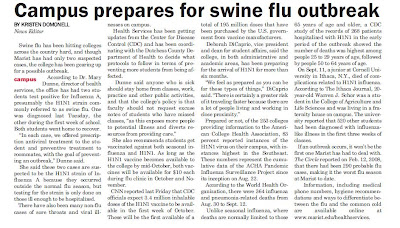
Swine flu has been hitting colleges across the country hard, and though Marist has had only two suspected cases, the college has been gearing up for a possible outbreak.
According to Dr. Mary Dunne, director of health services, the office has had two students test positive for Influenza A, presumably the H1N1 strain commonly referred to as swine flu. One was diagnosed last Tuesday, the other during the first week of school. Both students went home to recover.
"In each case, we offered prescription antiviral treatment to the student and preventive treatment to roommates, with the goal of preventing an outbreak," Dunne said.
She said these two cases are suspected to be the H1N1 strain of Influenza A because they occurred outside the normal flu season, but testing for the strain is only done on those ill enough to be hospitalized.
There have also been many non-flu cases of sore throats and viral illnesses on campus.
Health Services has been getting updates from the Center for Disease Control (CDC) and has been coordinating with the Dutchess County Department of Health to decide what protocols to follow in terms of preventing more students from being affected.
Dunne said anyone who is sick should stay home from classes, work, practice and other public activities, and that the college's policy is that faculty should not request excuse notes of students who have missed classes, "as this exposes more people to potential illness and diverts resources from providing care."
She also recommends students get vaccinated against both seasonal influenza and H1N1. As long as the H1N1 vaccine becomes available to the college by mid-October, both vaccines will be available for $10 each during flu clinic in October and November.
CNN reported last Friday that CDC officials expect 3.4 million inhalable doses of the H1N1 vaccine to be available in the first week of October. These will be the first available of a total of 195 million doses that have been purchased by the U.S. government from vaccine manufacturers.
Deborah DiCaprio, vice president and dean for student affairs, said the college, in both administrative and academic areas, has been preparing for the arrival of H1N1 for more than six months.
"We feel as prepared as you can be for these types of things," DiCaprio said. "There is certainly a greater risk of it traveling faster because there are a lot of people living and working in close proximity."
Prepared or not, of the 253 colleges providing information to the American College Health Association, 83 percent reported instances of the H1N1 virus on their campus, with instances highest in the Southeast. These numbers represent the cumulative data of the ACHA Pandemic Influenza Surveillance Project since its inception on August 22.
According to the World Health Organization, there were 364 influenza and pneumonia-related deaths from August 30 to Sept. 12.
Unlike seasonal influenza, where deaths are normally limited to those 65 years of age and older, a CDC study of the records of 268 patients hospitalized with H1N1 in the early period of the outbreak showed the number of deaths was highest among people 25 to 29 years of age, followed by people 50 to 64 years of age.
On Sept. 11, a junior at Cornell University in Ithaca, N.Y., died of complications related to H1N1 influenza. According to The Ithaca Journal, 20-year-old Warren J. Schor was a student in the College of Agriculture and Life Sciences and was living in a fraternity house on campus. The university reported that 520 other students had been diagnosed with influenza-like illness in the first three weeks of classes.
If an outbreak occurs, it won't be the first one Marist has had to deal with. The Circle reported on Feb. 12, 2008, that there had been 290 probable flu cases, making it the worst flu season at Marist to date.
Information, including medical phone numbers, hygiene recommendations and ways to differentiate between the flu and the common cold are available online at www.marist.edu/healthservices.
This article originally appeared 9/24/09 in The Circle
No comments:
Post a Comment